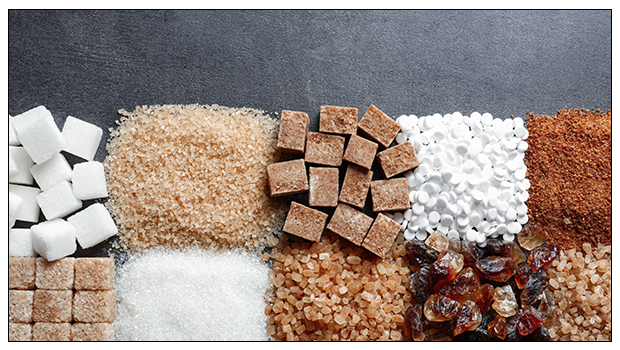
Maybe you are at that point where Sugar has be come your dietary weakness? Many people crave it. But even if you don’t necessarily have a sweet tooth, it can be tough to avoid sugar altogether. Nearly everything contains added sugar — from soda and other sweetened drinks to almost all processed foods.
Fortunately, a wide range of sugar substitutes and sweeteners — both natural and artificial — are available to help reduce the amount of table sugar in your diet. Limiting sugar intake is especially important for older adults. Excessive added sugar consumption may lead to obesity, type 2 diabetes, and heart disease. It has also been linked to poor cognitive function, affecting memory and increasing the risk of dementia.
How sugar affects your health
Sugar sweetens, preserves, and enhances the flavor of food. This makes it hard to avoid and resist, but the health benefits of reducing your sugar intake are clear. A diet high in sugar has been associated with a wide range of health conditions, either directly through its effect on the body or indirectly due to complications from obesity.
Complications include:
- Tooth decay and cavities
- Type 2 diabetes
- Weight gain and obesity
- Poor nutrition
- High triglyceride levels
Healthy sugar alternatives: How to choose the right sugar replacement for you
It may be difficult to sort through all the sugar alternatives on the market to decide which one is right for you. Here are a couple of things to consider:
Understand the four categories of sugar alternatives. There are four common types of sugar substitutes: artificial sweeteners, sugar alcohols, novel sweeteners, and natural sweeteners. Each has potential benefits and negatives depending on your goals.
Are sugar alternatives really a healthier option?
Whether or not sugar substitutes are a healthier choice for you depends on which type of sweetener you use, how much you use, and why you use it.
Artificial sweeteners. These synthetic sugar substitutes are intense sweeteners, so you only need a little bit to enhance flavors in food. They add no calories and may help with weight control, although the benefits of artificial sweeteners on weight loss in the long term are still unclear. Artificial sweeteners may be beneficial for those with diabetes since they don’t raise blood sugar. However, it’s important to consult with your doctor before using a sugar substitute if you have diabetes.
Some people have concerns about the safety of artificial sweeteners. However, all artificial sweeteners must be reviewed and cleared by the Food and Drug Administration (FDA). The FDA also provides consumption guidelines that outline the maximum quantity of artificial sweeteners you can safely have each day.
Sugar alcohols. Unlike sugar, sugar alcohols don’t cause tooth decay or cavities. Sugar alcohols also can help with weight control and diabetes management. This is because the body doesn’t completely absorb sugar alcohols. However, when consumed excessively, sugar alcohols can lead to digestive problems, such as diarrhea and bloating.
Novel sweeteners. These sweeteners are more difficult to categorize, but they generally derive from natural sources that are highly refined. Stevia is one of the most researched novel sweeteners. Although more research is needed, some studies have shown Stevia may have health benefits, such as lowering blood pressure, controlling diabetes, and helping with weight management.
Natural sweeteners. You may like the taste of natural sweeteners better than that of table sugar. But it’s important to know that even natural sweeteners often undergo processing and refining. They also tend to be high in calories. As with table sugar, natural sweeteners can cause health problems — such as tooth decay, weight gain, and poor nutrition — when consumed excessively. Moderation is key.
Top sugar substitutes and sweeteners
Use our list below as a handy guide to some of the most common sugar substitutes and how to incorporate them into your diet.
- Acesulfame potassium (brand names: Sunett, Sweet One)Type: Artificial sweetenerPotential benefits: As an artificial sweetener, acesulfame potassium (Ace-K) doesn’t contribute to tooth decay or raise blood sugar, and it adds no calories.How to use it: Besides adding it to food at the table, Ace-K is also heat-stable. This means you can use it in cooking and baking. It’s also often used in frozen desserts, candies, and beverages. Ace-K is about 200 times sweeter than sugar but doesn’t provide the same bulk or volume, so be sure to make appropriate recipe modifications when you use it in the kitchen.
- Agave nectarType: Natural sweetenerPotential benefits: Agave nectar provides more nutrients than regular sugar but fewer than honey. It’s very flavorful, so you may not need to use as much. However, it’s high in calories and contains a lot of fructose — even more than high-fructose corn syrup — which can lead to weight gain and obesity in excessive amounts. Agave nectar may not be a good choice for people with diabetes.How to use it: Agave is sweeter than sugar, has a long shelf life, and can be used in place of other sweeteners in nearly any cooking situation. Its taste is similar to honey, and it lacks the bitter aftertaste of some sugar substitutes. But because it is a liquid, you might have to make some other changes to your recipes, especially when baking.
- Coconut sugarType: Natural sweetenerPotential benefits: Coconut sugar is unrefined, so it retains all its vitamins and minerals, and doesn’t lead to fluctuations in blood sugar. However, coconut sugar has the same amount of calories as table sugar, and it’s still high in carbohydrates and fructose. This means people looking to lose weight should limit it. Also, it may not the best option for those who have diabetes.How to use it: Coconut sugar can be used as a 1-to-1 replacement for white or brown sugar, so it’s easy to use in the kitchen. However, it can be very coarse. You may want to grind it in a blender or food processor for a few moments before using it for baking or in place of powdered sugar.
- HoneyType: Natural sweetenerPotential benefits: Honey contains more nutrients than table sugar, including antioxidants, minerals, and vitamins. It’s also easier to digest than regular sugar. However, like table sugar, honey is high in calories and breaks down to glucose and fructose, so it poses some of the same health risks.How to use it: Honey can be particularly tasty in smoothies, baked goods, sauces, marinades, and salad dressings. Honey is sweeter than sugar, so you may have to reduce the amount you add. Since there’s water in honey, you’ll also want to reduce the liquid you use when substituting honey in baked goods.
- Monk fruit extracts (brand names: Nectresse, PureLo)Type: Novel sweetener (high intensity)Potential benefits: Monk fruit may be a healthy sugar substitute to try if you’re looking to restrict calories. You don’t need to use much, since monk fruit extract is 250-300 times sweeter than sugar. It’s also a zero-sugar, zero-calorie sweetener, with no harmful side effects, according to the FDA. However, commercially available monk fruit extracts have all been processed to some extent and may contain other sugars or sweeteners, so make sure to check the label.How to use it: Some find that monk fruit sweeteners have an aftertaste. If you’re sensitive to that type of flavoring, be cautious when incorporating it into cooking and baking. As with any other high-intensity sweetener, you may need to make alterations to your recipes.
- Date pasteType: Natural sweetenerPotential benefits: Dates are rich in fiber, minerals, and vitamins, so using date paste as a sweetener to your recipes can add more nutritional value to your diet than simply using regular sugar. Date paste is also an easy sugar alternative you can make at home in a blender using 3/4 cup of water, 1/2 teaspoon of vanilla extract, and about 1 cup of warm, pitted dates.How to use it: Dates can be particularly tasty in smoothies, baked goods, sauces, marinades, and salad dressings. Date paste can be sweeter than sugar, so you’ll have to reduce both the amount you add and the amount of liquid when baking.
- Maple syrupType: Natural sweetenerPotential benefits: Maple syrup is high in antioxidants and rich in minerals, including calcium, potassium, iron, zinc, and manganese. However, like other natural sweeteners, maple syrup is high in calories and should be consumed in moderation.How to use it: Think beyond pancakes and waffles. Maple syrup can be used in many different ways to add flavor to sweet and savory dishes. Use it in healthier breakfast options such as oatmeal or plain yogurt, or in savory dishes such as vegetables, chicken, salmon, or salad dressings. You can also use maple syrup when baking — just be sure to reduce the amount of liquids in the recipe.
- Stevia extracts (brand names: Pure Via, Truvia, SweetLeaf)Type: Novel sweetener (high intensity)Potential benefits: Stevia is a plant extract with little-to-no calories. It’s also much sweeter than sugar, so you need less of it to provide the same amount of sweetness. Since stevia extract is very low in calories, it’s considered a healthy sugar alternative for those who have diabetes or need to control their weight.How to use it: Though it’s non-chemical, stevia extract has a noticeable aftertaste even after it’s been refined, so some people don’t enjoy using it as a sweetener for coffee or tea. It comes in various forms, including powder and liquid, so you may need to experiment to find out which ones work best in different recipes. Stevia extract is also relatively stable in heat, so it can be used in cakes, sauces, and pastries.
- Sucralose (brand name: Splenda)Type: Artificial sweetenerPotential benefits: Sucralose is a zero-calorie sweetener that is a whopping 600 times sweeter than sugar. It’s been widely studied and is approved by the FDA as a safe sugar alternative for people looking to restrict calories, people with diabetes, and pregnant women or breastfeeding mothers.How to use it: There’s a wide range of sucralose products available, including sugar-sucralose blends specifically for baking, since sucralose is heat-stable. Sucralose can also be added to beverages and foods at the table. Pay attention to amounts: Even with the baking blend, you usually don’t need to use as much of it to enhance flavors.
- Xylitol (brand names: XyloSweet, Ideal, PolySweet)Type: Sugar alcoholPotential benefits: Xylitol, sorbitol, and other sugar alcohols are low-calorie sweeteners that are usually 25% to 100% as sweet as sugar. Sugar alcohols don’t promote tooth decay or cause a sudden increase in blood sugar, which may make it a good option for people with diabetes. However, like all sugar alcohols, xylitol may have a laxative effect — causing diarrhea and bloating — when consumed in large amounts.How to use it: Xylitol is widely found in chewing gum. It can also be used in other commercially manufactured products, such as sugar-free candies, jams or jellies, baked goods, and frozen yogurt. Xylitol comes in granulated form, making it is easy to use in place of sugar for beverages, fruit, or cereal.
Tips for reducing sugar in your diet
Follow these steps to help reduce sugar in your diet on a daily basis:
- Choose to drink water, calorie-free beverages, or low-fat milk instead of sugary sodas and drinks
- Choose whole fruits instead of processed desserts and fruit juices. When you do drink fruit juice, make sure it’s 100% fruit
- Add fruit to cereal instead of buying sweetened cereal or adding table sugar
- Use sugar-free preserves or fresh fruit to sweeten plain yogurt instead of eating sweetened yogurt with fruit in it
- Choose lower-calorie, sugar-free hot chocolate drinks instead of candy
- Snack on vegetables, fruit, low-fat cheese, or whole-wheat crackers
- Choose unsweetened products, such as unsweetened applesauce or nut butters
- Add flavors like vanilla, spices, or citrus to flavor foods and drinks
Article from aplaceformom.com












